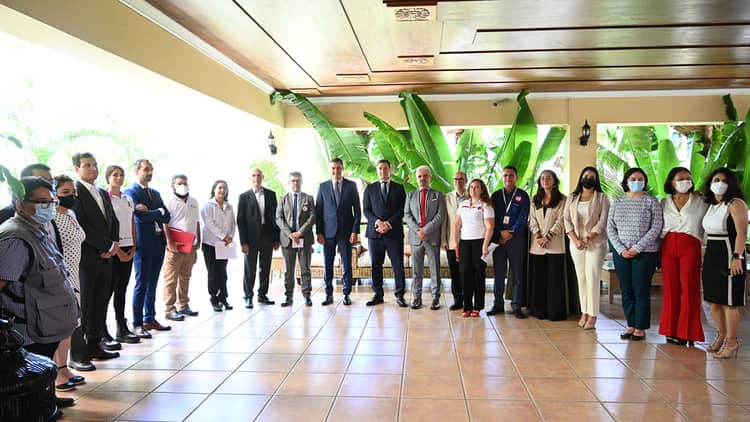Eduardo González
On August 27, 1992, exactly thirty years ago today, King Juan Carlos I sanctioned and promulgated the first reform of the 1978 Constitution, by virtue of which, and in application of the Maastricht Treaty, the right to active and passive suffrage in municipal elections was granted to all foreigners residing in Spain, “according to reciprocity criteria”.
The most immediate origin of the constitutional reform, from the normative point of view, was the Treaty of Maastricht of February 7, 1992, whose article eight establishes that “every citizen of the Union residing in a Member State (…) shall have the right to vote and to stand as a candidate in municipal elections in the Member State in which he resides under the same conditions as nationals of that State”. The real objective of this measure, based on the “principle of equality and non-discrimination between nationals and non-nationals” and on the “right of free movement and residence” provided for in the Treaty itself, was to create a European citizenship complementary to the nationality of each of the Member States.
Certainly, what Maastricht said was one thing and its application in each Member State was quite another, which meant that national Constitutions had to be reformed. In the case of Spain, the wording of the 1978 Constitution, as such, did not prohibit active suffrage (the right to vote) of foreigners in municipal elections, but neither did it recognize passive suffrage (the right to stand as a candidate), so that the “right to vote and stand as a candidate” provided for in the EU Treaty could not be applied without first reforming the Magna Carta.
Initially, it was thought that the major stumbling block to introducing passive suffrage was Article 23.1 of the Spanish Constitution, which stated that “citizens have the right to participate in public affairs, directly or through representatives, freely chosen in periodic elections by universal suffrage”. Therefore, the full application of Article 8 of Maastricht in Spain depended on how the term “citizen” was interpreted, either in a narrow sense as “national” or in a broader sense as “national or foreign person belonging to a given community”. To this end, the Government of Felipe González submitted a request to the Constitutional Court for a ruling on the apparent contradiction between the Constitution and Article 8 of the Treaty.
Curiously, the Constitutional Court determined that the main stumbling block was not Article 23.1, but Article 13.2, which recognized the right of foreigners to vote in municipal elections under certain conditions, but did not do the same with the passive right. Therefore, the Court decided that, although Article 23.1 included the concept of citizen “in the strict sense”, this concept did not exclude non-Spanish citizens, so the reform should be made in Article 13.2 of the Constitution, which was finally worded as follows: “Only Spaniards will be holders of the rights recognized in Article 23, except for what, according to reciprocity criteria, may be established by treaty or law for the right of active and passive suffrage in municipal elections” (BOE of August 28, 1992).
Reciprocity
Another important aspect of the reform, in accordance with Maastricht, is the “reciprocity criteria”. Since this measure requires equal application on both sides, foreign voting in Spain is only possible through bilateral agreements with countries that are willing to accept foreign voting in their own municipal elections, which is not always the case (Morocco is an example). Moreover, according to Spanish law, such agreements can only be signed with countries that have a free, transparent and guaranteed municipal electoral system (which excludes many). Also, the bilateral reciprocity treaty must be ratified by the Parliament of both parties.
Before the constitutional reform and outside the Maastricht Treaty, Spain had already signed bilateral treaties in this sense with the Netherlands, Denmark, Sweden and Norway. Finally, the approval of a multilateral treaty such as the Maastricht Treaty made the bilateral agreements with the Netherlands, Denmark and Sweden (and, of course, with the other eight Member States, excluding Spain) unnecessary, so that only the agreement with Norway, which did not belong and still does not belong to the Union, was maintained and remains in force. The exit of the United Kingdom from the EU forced Madrid and London to sign an electoral reciprocity agreement in January 2019. In the province of Malaga alone, the 73,000 British residents represent about 20% of the electoral roll in municipal elections.
Currently, Spain has bilateral agreements of this type with Bolivia, Cape Verde, Chile, Colombia, Korea, Ecuador, Iceland, Norway, New Zealand, Paraguay, Peru, United Kingdom and Trinidad and Tobago. Likewise, according to the Central Electoral Board, “all persons residing in Spain who, without having acquired the Spanish nationality, have the condition of citizens of the European Union, enjoy the right of active suffrage”.
Why in the municipal elections and not in others?
In any case, active and passive suffrage for foreigners applies only to municipal elections and, therefore, is not valid for general or regional elections. The main reason for this difference, according to the Constitutional Court, is that in the general and regional elections “bodies that hold powers attributed directly by the Constitution and the Statutes of Autonomy and linked to the ownership by the Spanish people of sovereignty”, specifically the legislative power, are elected. Therefore, foreign citizens cannot vote in these elections because they do not have “the ownership of sovereignty” in Spain.
On the other hand, this restriction does not apply to municipal elections because municipalities do not have legislative power and, therefore, do not imply any exercise of national sovereignty. In fact, the Constitution makes it clear that the election of councilors or mayors corresponds to “the residents of the municipality by universal, equal, free, direct and secret suffrage”, regardless of their nationality.







